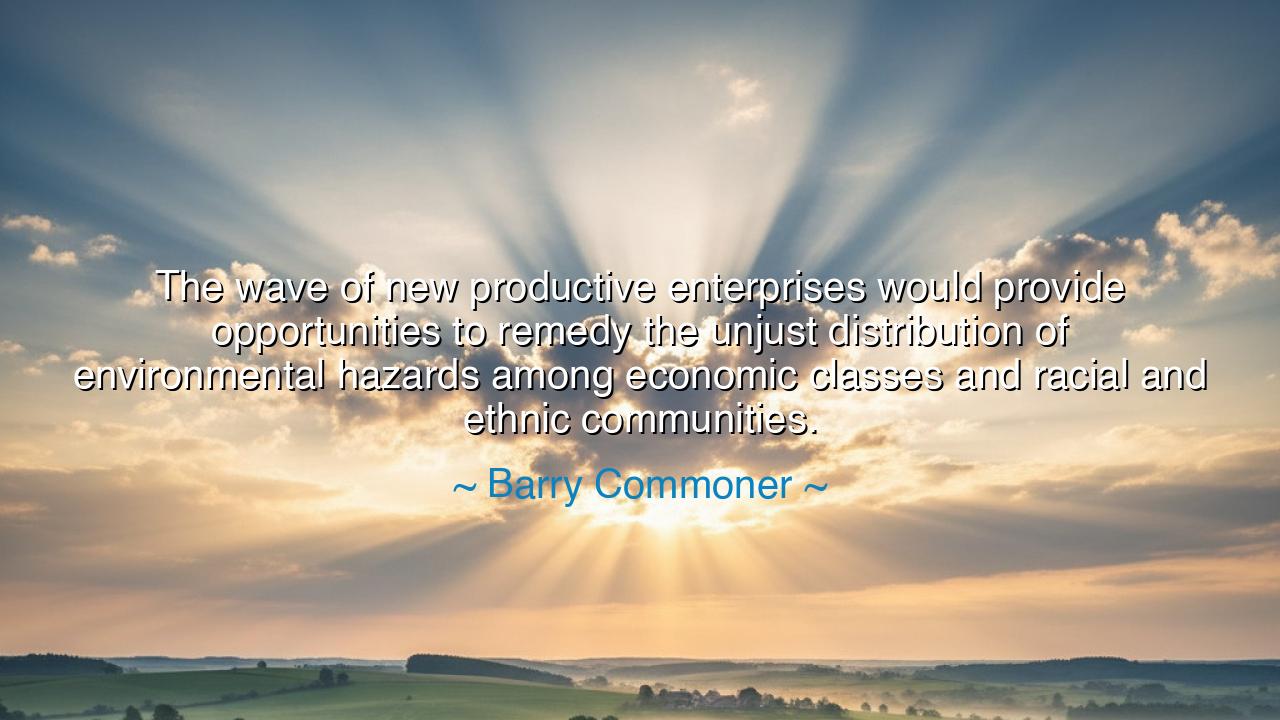
The wave of new productive enterprises would provide
The wave of new productive enterprises would provide opportunities to remedy the unjust distribution of environmental hazards among economic classes and racial and ethnic communities.






Hear the voice of Barry Commoner, the great herald of ecological justice, who proclaimed: “The wave of new productive enterprises would provide opportunities to remedy the unjust distribution of environmental hazards among economic classes and racial and ethnic communities.” These words, though rooted in the struggles of his time, resound as a timeless summons. For in them we hear both the sorrow of what has been—where the poor and the marginalized have borne the heaviest burden of pollution—and the hope of what could be, if human ingenuity is yoked not to greed but to justice.
Commoner speaks of new productive enterprises, the engines of innovation and labor that shape the destiny of nations. But he sees in them not merely machines of profit, but vessels of healing. He reminds us that every new factory, every new invention, every new field tilled or turbine built, carries within it the power to either deepen the scars of injustice or mend them. For too long, environmental hazards—toxic waste, poisoned rivers, foul air—have fallen most heavily upon the weak, those without wealth, those whose voices were silenced. To place the burden of survival upon the least powerful is an ancient cruelty, and Commoner’s call is to overturn this injustice.
Consider, O listener, the story of Love Canal in New York, where working-class families, many of them women and children, lived atop a hidden dump of chemical waste. Their homes, their schools, their very playgrounds became wells of poison. Illness spread, birth defects rose, and sorrow clouded the community. It was not the wealthy who suffered there, but those without influence, those whose neighborhoods were chosen as the dumping grounds for industry’s refuse. Out of their suffering arose a cry for justice, one that gave birth to the modern environmental movement. This tragedy stands as a stark reminder of the unjust distribution of hazard that Commoner so fervently opposed.
Yet Commoner’s words are not despairing; they are charged with vision. He speaks of a wave of enterprises—new technologies, renewable energies, sustainable industries—that could right these wrongs. Imagine, he urges, a world where solar fields rise in neglected communities, providing both clean air and honest work; where water is purified not only for the rich but for every household; where economic revival and environmental justice walk hand in hand. This is no dream of fantasy but a blueprint of possibility, if men and women of courage demand it.
The emotional heart of his teaching is this: progress without justice is not progress, but bondage disguised as prosperity. If new industries rise while the poor still breathe poisoned air, then the chain of injustice has not been broken, only gilded. True progress is measured not by the wealth of the few, but by the health and dignity of the many. And in this, Commoner reminds us that the earth belongs to all her children equally, not as a luxury for the privileged, but as a birthright for every soul.
The lesson is clear: we must build wisely, with equity at the foundation of every enterprise. Citizens must demand that new technologies do not simply enrich the powerful, but heal the wounds left in forgotten communities. Leaders must weigh every policy not only by its profit but by its justice. And individuals must open their eyes to where their waste goes, whose neighborhoods bear their refuse, and who pays the hidden price of their convenience.
What then shall you do? First, support enterprises that honor both people and planet, choosing with your labor and your spending to lift up the just. Second, raise your voice when injustice is hidden, for silence is the ally of oppression. Third, teach your children that clean air, clean water, and safe homes are not privileges, but rights to be guarded fiercely.
Remember always: the earth’s bounty was not given to one race, one class, one people, but to all. The wave of new enterprises that rises in your age must be more than engines of wealth—it must be a tide of healing, lifting those long drowned beneath the floods of neglect. In this way, the words of Barry Commoner will not remain a prophecy alone, but become a reality written in the air, the water, and the soil of a just and thriving world.






AAdministratorAdministrator
Welcome, honored guests. Please leave a comment, we will respond soon